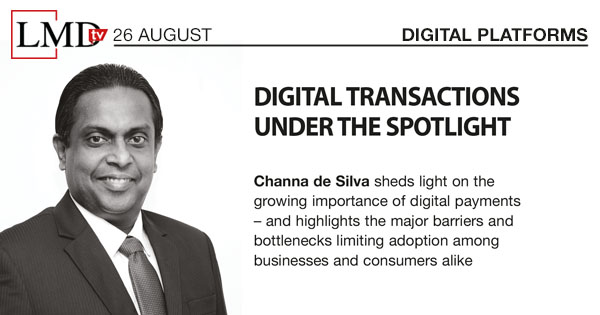While the infrastructure for digital payments has been present in Sri Lanka for some time, such services have not been adopted, noted Channa de Silva – the CEO of LankaClear. In his opinion, a fundamental problem that acts as a barrier to adoption is that Sri Lanka is a cash based society.
“Most transactions occurred through cash payments and a primary reason is that Sri Lanka is a well-banked country,” he explained, citing the numerous bank branches and ATMs located across the island.
He continued: “As access to cash was not an issue, the adoption of digital services wasn’t compelling until the outbreak of the COVID-19 pandemic.”
While many entities in the private sector have taken measures to adopt digital payment platforms, steps have also been afoot to introduce such platforms in the public sector.
“As a first step, digital payments were implemented for Sri Lanka Customs as businesses faced difficulties in making payments to clear goods during non-banking hours,” de Silva stated, estimating that more than Rs. 5 billion in transactions take place through this system, which links the agency to a number of banks through LankaClear’s network.
In addition to the Board of Investment of Sri Lanka (BOI) and Inland Revenue Department (IRD), LankaClear is looking to implement this system in Sri Lanka Post and the Excise Department of Sri Lanka.
However, he pointed to a lack of appropriate systems in some agencies as a primary bottleneck as well as getting banks on board.
When it comes to the use of cards in Sri Lanka, de Silva noted that fewer than 40 transactions are recorded on a daily basis on average despite the number of debit cards in the market exceeding the population.
To address the factors contributing to the lack of transactions – including smaller merchants being unable to bear the costs associated with international card schemes and customers’ unwillingness to use cards for payments – de Silva advocated the implementation of a local card scheme.
Additionally, he stated that this could reduce the billions of rupees spent on payments to global entities every year for transactions, which are largely between local parties.
As for lessons that Sri Lanka could learn from countries that have implemented digital payment platforms, de Silva believes that there is a need to inform the people about the potential economic benefits.
“People are not aware that cash is a major burden to the economy as it must be printed, distributed, recycled and transported,” he maintained, adding that “the general rule of thumb is that maintaining cash costs countries almost 1.5 percent of GDP.”
De Silva stressed: “If we could reduce this by a third, these funds could be redirected to social welfare and other programmes to benefit the economy.”
Furthermore, reducing cash transactions and promoting digital payments could also help tackle social issues related to SMEs that may never deposit funds in banks and lack credit histories as a result. This in turn leads to other challenges such as restricting their ability to obtain loans.
While Sri Lanka has implemented measures to facilitate digital transactions through the Electronic Transactions Act, which enables the use of digital signatures in payments to entities, few businesses capitalised on this until courier and postal services were halted by the pandemic.
“In my view, the main problem for banks, financial institutions and other businesses implementing digital systems is adoption as there’s no guarantee that these investments will be embraced by consumers,” he asserted.
With regard to policies that could facilitate the implementation of digital payment platforms, de Silva called for the government to promote the adoption of such services among consumers: “If electronic payments are preferred at government institutions rather than cash, credit or cheques, more people are likely to shift to digital transactions.”




